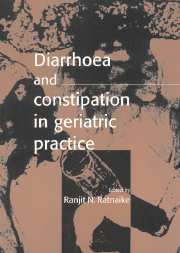Book contents
- Frontmatter
- Contents
- List of contributors
- Preface
- Acknowledgments
- Foreword by Gary R. Andrews
- I Defences of the aging gastrointestinal tract
- II Diarrhoea
- 3 Pathophysiology of diarrhoea
- 4 History and physical examination
- 5 The investigation of diarrhoea
- 6 Faecal incontinence
- 7 Drug-induced diarrhoea
- 8 Aetiology of infectious diarrhoea
- 9 Specific infectious conditions
- 10 An overview of management of infectious diarrhoea
- III Noninfectious clinical entities
- IV Constipation
- V Perspectives of altered bowel function
- Index
10 - An overview of management of infectious diarrhoea
Published online by Cambridge University Press: 17 August 2009
- Frontmatter
- Contents
- List of contributors
- Preface
- Acknowledgments
- Foreword by Gary R. Andrews
- I Defences of the aging gastrointestinal tract
- II Diarrhoea
- 3 Pathophysiology of diarrhoea
- 4 History and physical examination
- 5 The investigation of diarrhoea
- 6 Faecal incontinence
- 7 Drug-induced diarrhoea
- 8 Aetiology of infectious diarrhoea
- 9 Specific infectious conditions
- 10 An overview of management of infectious diarrhoea
- III Noninfectious clinical entities
- IV Constipation
- V Perspectives of altered bowel function
- Index
Summary
Most enteric infections cause mild diarrhoea and no therapy is necessary in healthy individuals. Diarrhoea should be regarded with caution in the elderly who are more susceptible to the complications of even a single episode of acute diarrhoea. The elderly with an illness coexistent at the time of diarrhoea are at even greater risk.
In the management of diarrhoea a sensible balance has to be struck between unnecessary treatment and neglect on the part of both the physician and patient. With regard to the healthy elderly, medical advice should be sought if a circumstance listed below occurs:
bloody diarrhoea
abdominal pain and tenderness, rectal pain, tenesmus
persistent vomiting and inability to retain fluids for a six-hour period
fever
evidence of dehydration
more than five to six bowel actions in 24 hours
patients with current medical problems
patients on drug therapy.
The frail, debilitated elderly and patients on medication should be advised to contact their physician at the onset of diarrhoea.
The patient (and/or care-giver) should be instructed about the need for increased fluid intake and a plan agreed on further intervention. The extent of involvement of the physician and treatment would depend on the nature and course of the diarrhoeal illness and the state of the patient's existing clinical status. Guidelines for advice during an episode of diarrhoea at home are:
decrease physical activity
[…]
- Type
- Chapter
- Information
- Diarrhoea and Constipation in Geriatric Practice , pp. 123 - 130Publisher: Cambridge University PressPrint publication year: 1999



